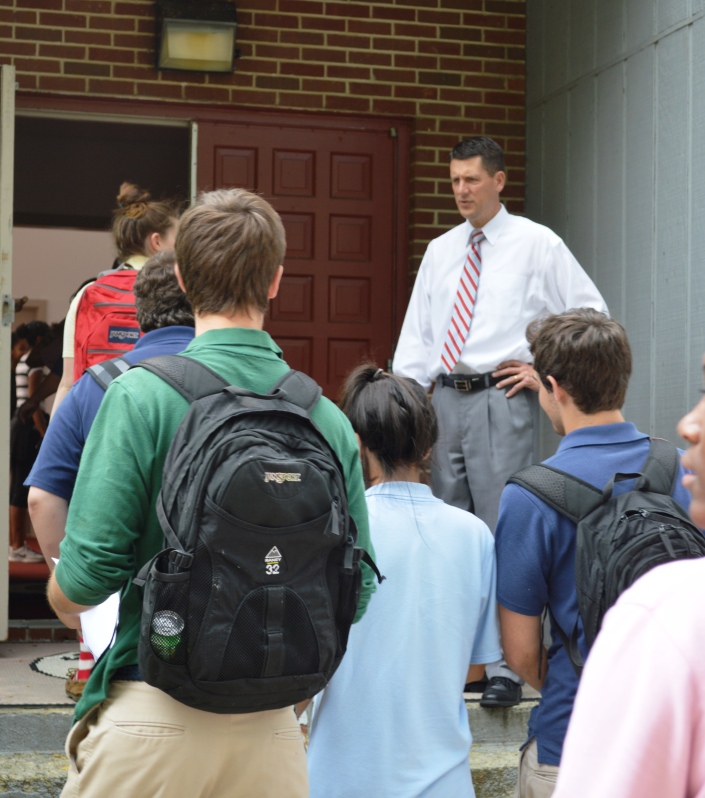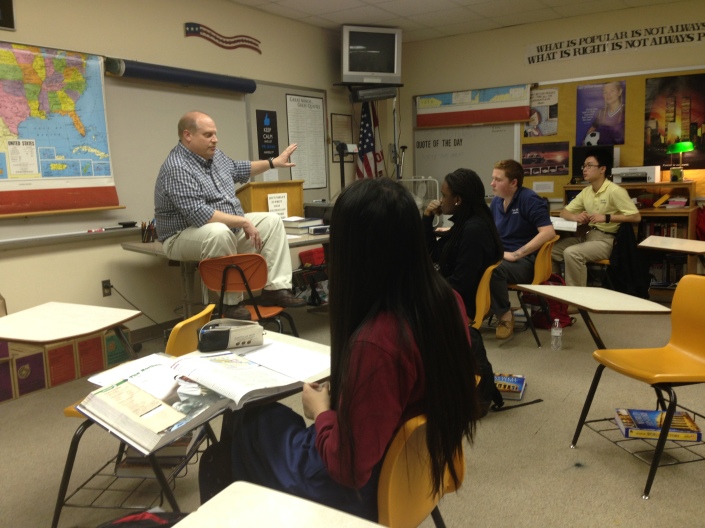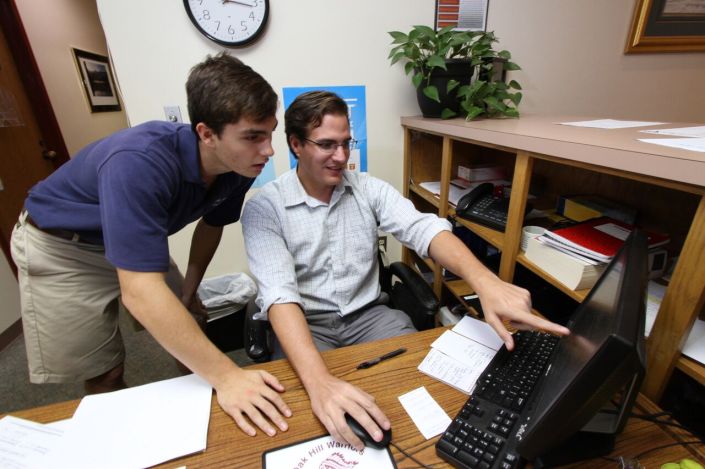Month: December 2015
Analyzing the “Every Student Succeeds Act” and What a Good Boarding School Offers
In 2002, the “No Child Left Behind Act” was signed into law. At the time, I was a teacher in a small public school in rural Oklahoma and, when the dust settled, I remember having very mixed emotions. On the one hand, the information-gathering focus of the law was encouraging – we seemed to be on the path of being able to quantify our students’ needs and shortcomings. On the other hand, a focus on standardized test performance seemed ill-fated. I remember my colleagues and I picturing a classroom where content and relevancy would be dictated by the question “will that be on the end of the year test?” To put it mildly, the teachers I taught with were fearful of losing the “teachable” moments where the discovery of learning and self-actualization that comes with an engaging classroom would be replaced with “teaching to a test.” The fact that school funding would be tied to this dynamic was scary. We lamented that the focus did not seem to on the child, but rather the school district – we began to refer to it as the “The No School Left Behind Act.”
Flash forward to 2015 and many of the initial fears of NCLB have been realized. Good-intentioned as it was, in the rush for school performance numbers, many teachers became disillusioned and children were still being left behind. On December 10, 2015 the “Every Child Succeeds Act” (ESSA) was signed into law, representing the culmination of 4+ years of massive effort from Educators and Law-Makers (from both sides of the aisle) to improve upon the ideas of NCLB. I, for one, applaud the shift in focus away from standardized test scores and toward classroom quality that this law represents. It’s encouraging in many ways (For a summary see: http://www.ed.gov/essa). Still, many families (with the financial means and inclination) will continue to compare the public school experience and the opportunities available in a private, boarding school environment.
In my current position as Director of Admission at Oak Hill Academy, I spend a lot of time with people at this juncture. In my own education background, I attended both a large public high school and two small boarding high schools and, in my career, I’ve taught in both settings. Oak Hill Academy occupies a very unique position in the boarding school world – college-prep, but not “sink or swim” and our niche is in working with students who have not had the kind of success of which they are capable and who may have become unmotivated. Surely, my perspective here is shaped by this mission and the opinions expressed are my own.
Here, I’d like to offer some insight, using some of the key features of ESSA, for those considering Boarding School as an opportunity, that for some students and families, can represent a better educational fit. I must stress up front that there is a spectrum of boarding schools, each with a different culture, focus and mission and for those considering boarding school, choosing one should come down to knowing your child’s needs and personality and knowing the prospective school well. It is a big decision and far from a “cookie cutter” proposition. The following may help you form the questions that guide your research and consideration.
ESSA requires high academic standards that will prepare them to succeed in college and careers.
For the motivated student in public school, this is great news – it will lead to more challenging and, probably, more engaging classrooms. But for unmotivated students, or those with learning styles that are difficult to address in large classroom settings, this could widen the performance gap.
As for motivation toward college success? For students, boarding school often feels like a huge “step toward college” and can be essential in building confidence that leads to motivation and college aspiration. Being away from home can be empowering in this regard. At Oak Hill Academy, I see students who come to own their success and want more of it – largely because they are building the self-confidence that comes from being away from home. There’s a safety net of structure (lights out, school-wide study time built into the schedule, afterschool tutorials), but the students are more likely to “own” their educational experience.
ESSA ensures that vital information is provided to educators, families, students, and communities through annual statewide assessments that measure students’ progress toward those high standards.
Here again, the big advantage of small boarding schools is classroom size. This feedback on student progress is crucial, and in a classroom size of 20-30 students (or more), testing is required to obtain this information. At Oak Hill Academy and other small boarding schools with class sizes of 10-12 students, the relational aspect of knowing your student well (and vice versa) means that progress is more organically measurable. Classroom assessment is done on a daily a basis through discussion, direct interaction and a wider variety of learning style engagement.
In a small boarding school environment, interpersonal intelligence and social development can be the most observable areas of growth – apart from academic standards of progress. An engaging campus life is a big benefit of a good boarding school. Through exposure to a wide variety of afterschool and weekend activities, students can develop new passions and the “soft skills” of social intelligence. In a large-school setting, the door to these opportunities are often guarded by the “bouncers” of confidence, social pressure, or even transportation logistics. In a small boarding school, like Oak Hill Academy, there is a much greater sense of belonging to a community that can make these activities more accessible.
ESSA maintains an expectation that there will be accountability and action to effect positive change in our lowest-performing schools, where groups of students are not making progress…
Clearly this is emphasizing teacher accountability and, for good teachers, this is not something to fear. I often point out to prospective students that a small boarding school (where we live together 24/7 for long stretches of time) will expose your areas of weakness AND force you to deal with them. This is also true for our faculty. In large school districts, with tenure possible, it is often exceedingly difficult to identify and improve underperforming teachers even with testing standards in place. Often the best aspects of teaching are not quantifiable such as how we build self confidence, self esteem, mentor and, in general, lift up our students. These things require an environment where relationships are a focus. This is difficult (not impossible) to achieve in large public school settings, but it is next to impossible to assess in a large faculty. Small boarding schools like Oak Hill Academy, with 150 students and a teaching faculty of 22, have a student to teacher ratio that ensures these relational aspects are real and on display. It has allowed building (and culling when necessary) a staff that is mission-appropriate.
The newly enacted ESSA represents a great step forward in addressing the challenges facing our public school system. But, there will always be a place for the boarding school option as an alternative. If you or your student is considering boarding school, hopefully these thoughts can add to the discussion about what makes a boarding school “good.” More importantly, it can help guide your search for a boarding school that is a “good” fit. I invite you to contact me to discuss this topic or Oak Hill Academy specifically and to learn more about your student.
Mike Rodgers, Oak Hill Academy (276) 579-2619 or mrodgers@oak-hill.net
Boarding School Morning Devotions: “Why We Teach”
One of the hallmarks of campus life at Oak Hill Academy is that we start each school day, together as a school community, in homeroom in the Chapel. We open the day in short prayer and a devotion is delivered by different members of the school community – including students on Friday. Our campus minister gave this morning’s devotion, and it was perhaps more obviously linked to a Bible verse than usual. I found it a powerful message on a lot of levels. As our students prepare for mid-term exams later this week, it was a good challenge to finish strong and to let them know that our faculty is in their corner to help them do just that. I also feel it gives a good insight to the campus culture and the approach our teachers take in establishing a very relational classroom experience for our students.

Please see the transcript of the following devotion, delivered this morning by Rev. Doug Turnmire, our campus minister and faculty member.
Ephesians 4:11-12, “It was he (Jesus the Christ) who gave some to be apostles, some to be prophets, some to be evangelists, and some to be pastors and teachers, to prepare God’s people for works of service, so that the body of Christ may be built up until we reach all unity in the faith and in the knowledge of the Son of God and become mature, attaining to the whole measure of the fullness of Christ.”
Working with adolescents it is common to hear them talk about what they want to do in life. I guess we’ve all had those discussions. As a kid I wanted to be an archaeologist. I’m still fascinated by what past civilizations reveal to us about our common humanity.
Saturday night some of us went Christmas caroling. We had a lovely time. I enjoyed it more and more as we went from house to house. I drove a van with students, and when I drive with students I usually tune out their conversations. Think about others stuff, or at least pay attention to driving so as to not hit any deer. But Saturday night a conversation caught my ear. It was another “what do you want to do in life” discussions, and one person said, “I don’t want to be a teacher. That takes too much patience. I don’t know how teachers put up with us. I couldn’t do it.”
I don’t know about other teachers, but there are days I don’t know if I can do it. I became a teacher by accident. Teaching came with the job of being the school chaplain and pastor of Young’s Chapel. Before coming here I spent a year in a chaplain residency program at a major trauma hospital. When I interviewed for the position I thought, “ I’ve always liked school. I’ll give teaching a shot.” Probably not the best reason to be a teacher.
Why teach? True or False: For the money….
We teach because we believe teaching saves humanity. We teach because we believe you deserve the ability to think, to discover your talents, to uncover your creativity. We teach because each generation deserves the chance to make the world a better place than the previous generation. We teach to you not only the ability to survive, but to thrive, and create hope for the generation after you. We teach so we will not live in ignorance because ignorance leads to fear; fear leads to anger; anger leads to hate; and hate leads to suffering (to quote Yoda.)
We teach because we believe each of you has potential you have not appreciated, or you have not discovered. We teach because we believe God gives each of us talents to use for ourselves and for others. We teach because we believe each of you is a child of God, created in God’s image, loved by God. And God has given us the opportunity and responsibility to use our gifts wisely. We teach so you are prepared to work and serve in our world.



You must be logged in to post a comment.